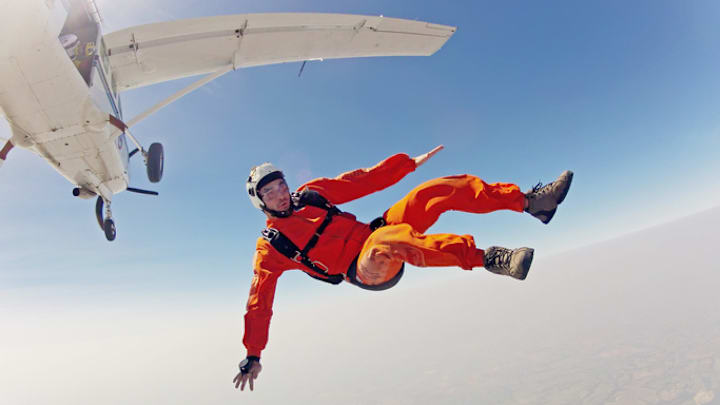In the early 1940s, the United States Army was testing the idea of parachuting from planes as a way of deploying troops. The first group to really experiment with it and begin developing paratrooper techniques was a unit of 50 service members known the Parachute Test Platoon.
They were based at Fort Benning, Georgia, and spent most of their summer working through grueling training sessions in the afternoon heat, wearing parachutes on their backs along with the rest of their standard gear. When training was done for the day, the troops liked to loosen up and cool down a little. Usually, most of them went to the air-conditioned Main Post Theatre in the evenings to see a movie.
One night in August 1940, that movie happened to be the Paramount western, Geronimo, about the Chiricahua Apache chief and military leader.
After the movie, there was beer. After beer, there was, as there often is, a boast. On their way back to their bunks after the film, the group got to talking about the jump they were doing the next day, their first as a group. The paratroopers only had a few solo jumps under their belts, and many of them were admittedly nervous. Private Aubrey Eberhardt, a brawny, 6-foot-3-inch soldier from Georgia, claimed that he wasn’t worried. This mass jump would be nothing.
The other soldiers gave him a hard time. They were all scared. Of course he was scared, too. He should just admit it.
Eberhardt finally relented and told them what he was going to do—to prove to them that he wasn’t afraid, he was going to shout “Geronimo!” as loud as he could when he leapt out the plane’s door.
The next day, out the plane he went, and everyone heard “Geronimooooooo!” The rest of the platoon wasn’t about to let Eberhardt show them up, so on subsequent jumps the rest of the soldiers took up his battle cry. A tradition was born. The next year, the Army’s first official parachute unit, the 501st Parachute Infantry Battalion, made “Geronimo” the motto on their unit insignia after their commander tracked down descendants of the real Geronimo to ask their permission to use his name. (The chief’s given name was actually Goyahkla. Geronimo was a nickname referencing his fierceness when fighting Mexican soldiers who prayed to St. Jerome.)
After World War II, the Army brass put an end to the mid-air yelling, worried that a screaming paratrooper would give away a unit’s position during operations. The heavy media coverage of the novel paratroopers during the war, however, put the “Geronimo” cry in the public’s imagination. Aubrey Eberhardt’s boozy brag lives on.
A version of this story was published in 2013; it has been updated for 2024.
